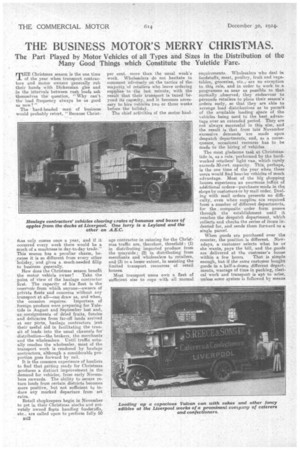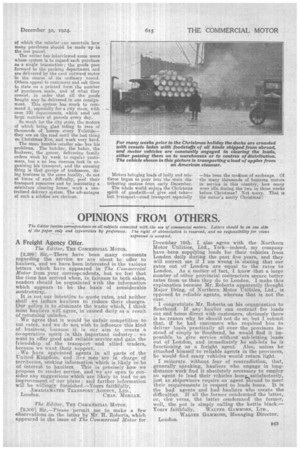THE BUSINESS MOTOR'S MERRY CHRISTMAS.
Page 26

Page 27

If you've noticed an error in this article please click here to report it so we can fix it.
The Part Played by Motor Vehicles of all Types and Sizes in the Distribution of the Many Good Things which Constitute the Yuletide Fare.
MILE Christmas season is the one time 1 of the year when transport contractors and motor owners generally rub their hands with Dickensian glee and in the intervals between rush loads ask themselves the question, " Why can't the load frequency always be as good as now? ".
The hard-headed man of business would probably retort, " Because Christ
rhas only comes once a year, and if it occurred every week there would be a much of a muchness in day-to-day trade." This season has a peculiar charm, because it is so different from every other holiday, and gives a much-needed fillip to business generally.
How does the Christmas season benefit the motor vehicle owner? Take the point of 'view of the haulage contractor first. The capacity of his fleet is the reservoir-from which anyone—owners of private fleets and concerns without any transport at all—can draw as, and when, the occasion requires. Importers of foreign produce were preparing for Yuletide in August and September last and, as consignments of dried fruits, fancies and delicacies from far-off lands arrived at our ports, haulage contractors lent their' useful aid in facilitating the transit of loads into the usual channels for .distribution—the brokers, the merchants and the wholesalers. Until traffic actually reaches the wholesaler, most of the transport work is rendered by haulage contractors, although a considerable proportion goes forward by rail. R is the common experience of hauliers to find that getting ready for Christmas produces a distinct improvement in the demand for vehicles, from early Novembers onwards. The ability to secure return loads from certain districts becomes more positive, but not sufficient to induce any marked departure from set rates.
Retail shopkeepers begin in November to get in their Christmas stocks and privately owned fle,ets handing foodstuffs, etc., are called upon to perform fully 50 • 342 per cent. more than the usual week's work. Wholesalers do not hesitate to comment adversely on the tactics of the. majority, 'of retailers who leave ordering supplies to the last minute, with the result that their transport is taxed beyond its capatity, and it becomes necessary to hire vehicles two or three weeks before the holiday.
The chief activities of the motor haul
age contractor in catering for the Christmas traffic are, therefore, threefold: (I) in distributing imported produce from the quayside; (2) in distributing from merchants and wholesalers to retailers, and (3) to a lesser extent, in assisting the limited transport resources of retail houses.
Most transport users own a fleet of sufficient size to cope with all normal
requirements. Wholesalers who deal in foodstuffs, meat, poultry, fruit and vegetables, groceries, etc.,are no exception to this rule, and in order to work to a programme as near as possible to that normally observed, they endeavour to persuade retailers to place their season's orders early, so that they are able to arrange load distributions as to permitof the available loading space of the vehicles being used to the best advantage over an extended period. They are not always successful in this aim, and the result is that from late November excessive demands are made upon despatch departments, and, as a consequence, occasional recourse has to be made to the hiring of vehicles.
The most gladsome task at Christmastide iS, as a rule,•performed by the hardworked retailers' light van, which rarely exceeds 30-cwt. capacity. This, perhaps, is the one time of the year when these users would find heavier vehicles of much advantage. Most of the big shopping houses experience an enormous influx of additional orders—purchases-made in the shops by customers or by mail order. Dealing with mail orders presents no difficulty, even when supplies are required from a number of different departments, for the composite order form passes through the establishment until it reaches the despatch department, which collects and checks the series of items indented for, and sends them forward as a single parcel.
When goods are purchased over the counter, the position is different. Nowadays, a customer selects what he or she wants, pays the bill, and the goods are delivered at the customer's house within a few hours. That is simple enough, but if the same customer bought goods in a half-a-dozen different departments, wastage of time in packing, clerical work and transport is aptto arise, unless some system is followed by means of which the retailer can ascertain how many purchases should be made up in the one parcel.
The writer has interviewed some users whose system is to regard each purchase as a single transaction ; the goods pass forward to the packing department and are delivered by the next outward motor in the course of its ordinary round. Others appeal to customers and ask them to state on a printed form the number of purchases made, and of what they consist, in order that alt, the goods bought may be delivered in one consignment. This system has much to commend it, especially for a city store, with over 100 departments, which send out large numbers of parcels every day.
So much for the city store, the motors of which bring glad tiding to tens of thousands of homes every Yuletide— they are on the road until the last thing no Christmas Eve, and work very hard.
The more humble retailer also has his problems. The butcher, the baker, the fruiterer, the grocer, delivering family orders week by week to regular customers, has a no less onerous task in organizing his transport, and the amazing thing is that groups of tradesmen, doing business in the same locality, do not at times of such difficulty, pool their transport resources and by instituting a miniature clearing house, work a centralized delivery system. The advantages of such a scheme are obvious. Motors bringing loads of holly and mistletoe began to pour into the main distributing centres from early December.
The whole world enjoys the Christmas spirit of goodwill—of, give and take— but transport—road transport especially —has been the medium of exchange. Of the many thousands of business motors in service in this country, how many were idle during the two or three weeks before Christmas? Not many. That is the motor's merry Christmas!






























